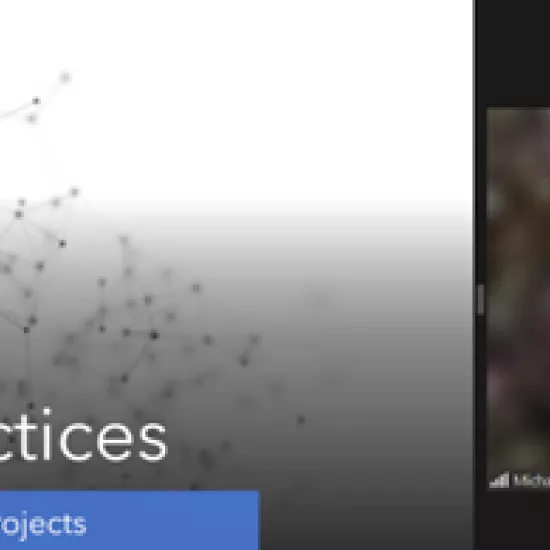IMI Big Data & Artificial Intelligence Case Competition: An Annual Event Highlighting Multidisciplinary Collaboration and Innovation
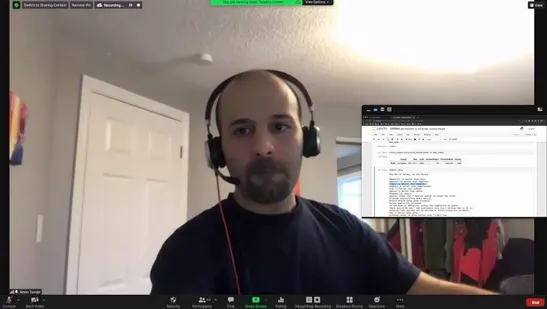
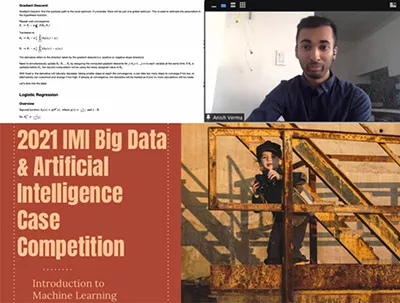
Screenshot by Prof. Kevin E. Yousie
The 2021 Institute for Management & Innovation Big Data & Artificial Intelligence Case Competition is off to an excellent start. Sponsored by the BIGDataAIHUB within the Institute for Management & Innovation (IMI) at the University of Toronto Mississauga (UTM), this competition is being held in collaboration with Scotiabank, STEM Fellowship and ICUBE. Now in its second year, the competition has become an important annual event for the University of Toronto community.
The Institute for Management and Innovation (IMI) is a cutting-edge, multi-disciplinary research and teaching hub that aims to foster collaboration and innovation in order to impact policy, business, and people. With the world changing at a pace once only imaginable on movie screens, students today are faced with an unprecedented job market coupled with a world that is dealing with extraordinary challenges. IMI recognizes the reality faced by students today and has built its mission with this in mind.
The competition got underway in November, with a very successful kick-off event held on November 28, featuring speakers from the university and senior executives from Scotiabank. It runs until the end of March. More than just a run-of-the-mill data hackathon, the competition is designed to serve as an intensive and comprehensive personal developmental opportunity for participants.
Hands-on, experiential learning is a core tenet of IMI’s teaching philosophy, as it understands learning does not just happen strictly in an academic setting, like a classroom, (or these days on a formal Zoom call). Students need to be given the opportunity to immerse themselves in their subject matter and then apply what they have learned to real-world situations. This not only makes the learning experience more enjoyable, but it also ensures that the effectiveness of the learning experience is increased. The IMI Big Data & Artificial Intelligence Case Competition fully encapsulates this. The competition provides students with an opportunity to put the skills they have learned in a classroom to practical use, while collaborating in teams.
The importance of big data, artificial intelligence, and machine learning cannot be overstated. While the notion of artificial intelligence and machine learning can render images of a futuristic dystopia, the reality is that these are the tools that will create significant new opportunities and help solve some of the biggest problems facing the world today. In fact, some experts estimate that within the next 10 years, AI will contribute roughly $15.7 trillion to the global GDP, exceeding the current combined output of India and China2. That would mean that by 2030, AI would add 14% to the global GDP. While some existing jobs will be eliminated, the number of new and rewarding jobs created by AI have been forecasted to outnumber the jobs displaced by AI for those prepared to step into them3.
The IMI Big Data & Artificial Intelligence Case Competition aims to provide teams of graduate and experienced undergraduate students with the opportunity to apply their knowledge to the analysis of large datasets, artificial intelligence, and machine learning. It is designed to be a hands-on experience that tests the students’ analytical, teamwork, communication, and presentation skills. Similar to last year’s competition, the primary focus this year is on the use of AI in financial institutions. The task for this year’s competitors is to use their skills in order to identify accounts that are potentially at risk for illegal money laundering operations.
Participants have also had the opportunity to gain experience in working with non-financial data as well through the weekly workshops that have been held in January. For example:
- In the second workshop entitled Data Manipulation in Python using Pandas, a presenter from Scotiabank used current COVID-19 data and was able to quickly break down and then chart the trends in COVID-19 by each individual county across the United States. By marrying the COVID data with population data he took from the Internet, he then generated % infection ratios by county over the past year up to the day before the workshop.
- Similarly, in the third workshop entitled Supervised and Unsupervised Learning with Sklearn, the presenter from STEM Fellowship used breast cancer data. He used statistics, algebra, and machine learning to assess numerous variables and then clustered the combinations into those that were likely to be cancerous or benign. The visuals of the resulting clusters were impressive.
Competitors were encouraged to use their own JupyterHub notebooks to keep up with and replicate what the presenters were doing during these Zoom workshops. The other two workshops covered an introduction to Jupyter Notebooks and Python Basics, and Hyperparameter Tuning and Model Selection.
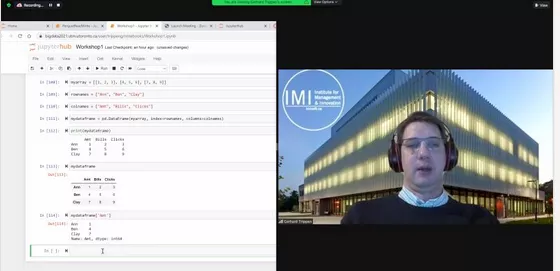
Screenshot by Prof. Kevin E. Yousie
In keeping with the ethos of IMI’s multi-disciplinary approach, the diversity of the student competitors is no surprise. There are 85 registered participants, 16 at the Ph.D. level, 42 Masters students, and 37 undergraduates from all three University of Toronto campuses. Participants come from a wide range of academic disciplines including: psychology, kinesiology, biotechnology, digital health technologies, Rotman M.B.A., environmental science, physics, statistics, medicine pathobiology, computational science, math, science, and engineering sciences.
Given the varied backgrounds of the competitors, this year’s competition seeks to capitalize on the myriad of possible ways to identify at risk accounts by providing participants with a range of solutions, all with varying degrees of difficulty. This year’s competition has three different levels of difficulty and competitors can choose to employ a strategy best suited to their background and skill level. They are:
- Using labelled data in order to automate an expert, which would be considered the first-tier level of difficulty;
- Improving the accuracy by augmenting the data provided, which is the mid-tier range in difficulty;
- For those seeking to really challenge themselves, identify suspect accounts by employing unsupervised machine learning.
The competition has two rounds of judging. For the preliminary round on February 20th, competitors will provide video submissions describing the approach they are taking. From the videos, a team of judges will select five finalists. The finalists will be asked to prepare written submissions of their work for potential publication. Then, on March 27, the final competition gets underway. Participants will present their solutions to a panel of judges via Zoom and respond to questions that will be put to them. Aside from bragging rights, competitors will have a shot at competing for prizes totalling $15,000.
As noted above, the students are supported by a team of data scientists from Scotiabank. The competitors were also provided with access to an email hotline they can use to contact the data scientists directly if they have any questions about the data. In addition, faculty members from IMI and experts from UTM’s Information and Instructional Technology group have also played significant roles in making the competition a success.
By providing U of T students with this opportunity to showcase their skills to business practitioners, the case competition not only seeks to provide student competitors with valuable, real-world experience they can apply to the job market, it also fosters collaboration and innovation, which is particularly needed in a time when social distancing and isolation are proving to be challenges in and of themselves.
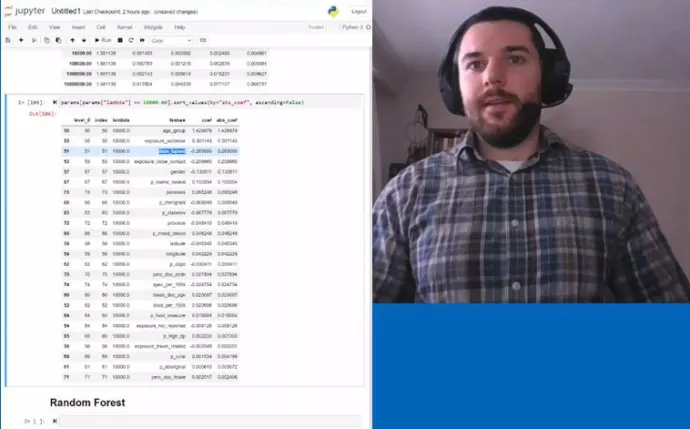
Screenshot by Prof. Kevin E. Yousie
While the investigation into suspected illegal money laundering operations is ultimately the task of law enforcement, financial institutions need better tools at their disposal to be able to identify accounts that are either actively engaged in clandestine activity, or are at risk for it. Students engaged in this IMI competition can take great pride in knowing that their participation is working towards making the world a markedly better and safer place.
Bringing leaders of commerce, academia, and the world’s brightest students together through the IMI Big Data & Artificial Intelligence Case Competition is just one of the many ways the Institute for Management & Innovation at the University of Toronto is applying its multi-disciplinary, real-world solutions to some of the world’s most pressing policy problems, all while fostering cross-disciplinary knowledge transfer, collaboration, and importantly, innovation.
[1] https://www.linkedin.com/posts/kevinyousie_dr-amin-torabi-sr-manager-aml-models-activity-6754856877429010432-jNpt
[2] https://www.pwc.com/gx/en/issues/analytics/assets/pwc-ai-analysis-sizing-the-prize-report.pdf
[3] http://www3.weforum.org/docs/WEF_Future_of_Jobs_2020.pdf

